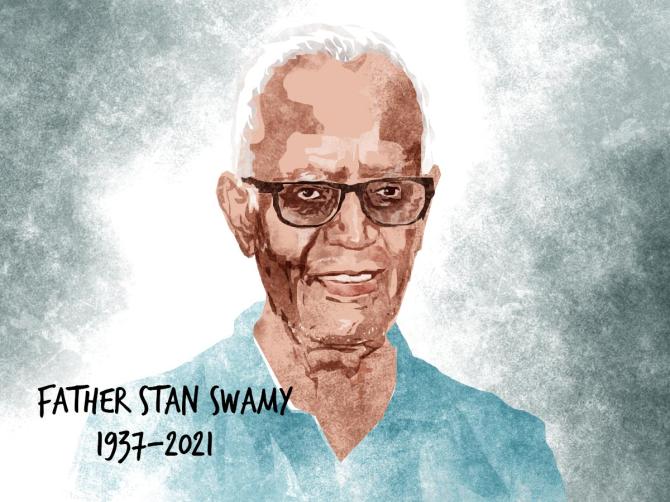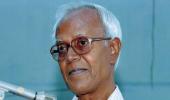One unwanted fallout of Stan Swamy's death from the government's point of view will be the increased attention on those senior citizens who are still in jail on charges which are taking a long time to prove, believes Amulya Ganguli.

Before the National Investigation Agency suspected Stan Swamy of waging a war against India, the octogenarian Jesuit priest was hardly known outside his immediate locale in Jharkhand where he claimed to be serving the tribals.
The rest of India was unaware of his existence. Now his fame is worldwide.
Not only that, he has attracted effusive, though belated, praise from the judiciary, which has called him a 'wonderful person' who had rendered 'services... to the society' for which the court had 'respect'.
Not since a British judge told Mahatma Gandhi that 'nobody would be happier than me' when he was released has an accused being lauded in such terms.
All these tributes cannot but be an uncomfortable, jarring, experience for the NIA and the government.
Not surprisingly, the NIA objected to the judge's remarks, which he has now withdrawn.
Even if 'this is not the NIA' which former home minister P Chidambaram now says he had envisaged when it was set up in Manmohan Singh government's time, the possibility of a powerful government agency becoming a Frankenstein's monster is always there.
While it is theoretically possible for a subsequent government to rein in a rogue agency, the social and political scene will always have to contend with right-wing elements who celebrated Stan Swamy's death and abused those who mourned his passing away.
While one rightist troll tweeted, 'a criminal less', another wrote, 'he got easy end. People like him should hang on street (sic) until death.'
Those at a slightly higher level in the hate camp have invoked the sinister role of the ecclesiastical doctrine of liberation theology in India although it is mainly associated with Latin American movements against dictators.
According to this camp, the church uses martyrs not only to buttress its own image, but also to target the 'others'; including Jews and Hindus.
These critics of Stan Swamy believe that he was engaged in such a diabolical campaign.
However, even as the Hindu Right tries to bolster the NIA's case against the priest, the government is having to rebut the criticism of India's human rights record by, among others, the special UN rapporteur and the US commission on international religious freedom.
There is little doubt that the external affairs minister, Subrahmanyam Jaishankar, will again have to reject such charges by bragging about India's respect for civil liberties as he has been doing in the context of the worldwide concern expressed on the farmers' agitation and the categorisation of India as 'partly free' by an American think-tank.
However, the government's task is palpably becoming increasingly difficult. It must also worried that no other deaths in custody take place of elderly activists who have been locked up by the NIA on charges similar to those levelled against Stan Swamy.
Although India has experienced Maoist uprisings from West Bengal (in Naxalbari from where the Naxalites or Maoists have derived their name) to Andhra Pradesh to Maharashtra, and also insurgency in the north-east and Kashmir, rarely have so many prominent social activists been kept in detention for so long.
One unwanted fallout of Stan Swamy's death from the government's point of view will be the increased attention on those senior citizens who are still in jail on charges which are taking a long time to prove.
That none of them is a politician and that all of them were mostly engaged in social service will also be noted to the government's discomfiture.
It is a denouement which Stan Swamy would have liked -- not the government's discomfort -- but the fact of the attention which the oppressed sections of the population continue to need from activists working outside the administrative infrastructure which is not always very compassionate.
For Stan Swamy, life after death can be deemed rewarding.
Amulya Ganguli is a writer on current affairs.











 © 2025
© 2025